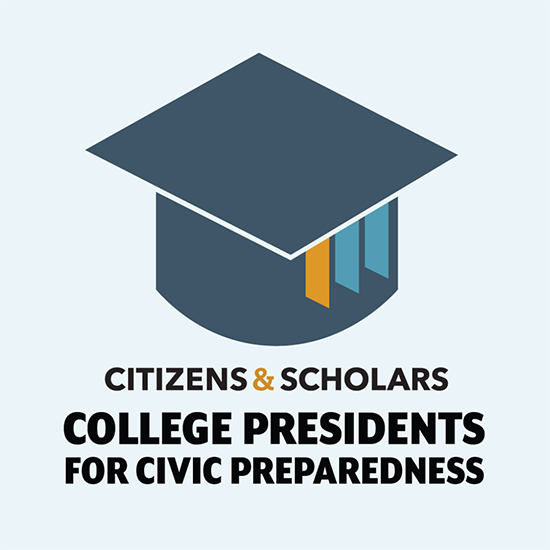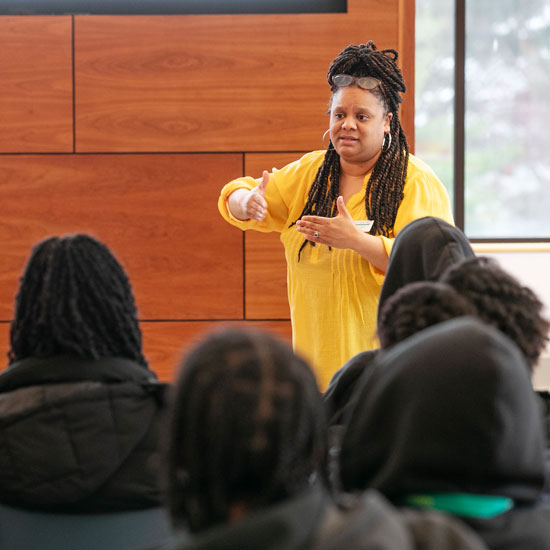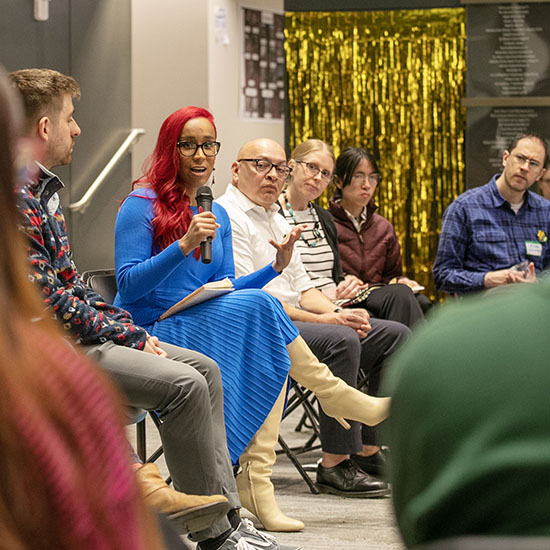Why hurricanes are coming north
A recent Scientific Reports article co-authored by Amy Frappier of Skidmore's geosciences faculty suggests that the northeastern U.S. could be struck by more and stronger hurricanes in the future. The study, led by scientists at England's Durham University, shows that Caribbean hurricanes have been gradually moving northward in recent centuries and argues that New York and other major eastern-corridor cities need to be better prepared for such storms.
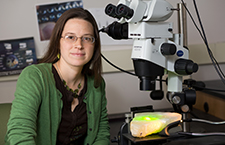
Prof. Amy Frappier finds traces of chemical
isotopes that reveal past storms or other
environmental events.
The researchers charted hurricane rainfall in the western Caribbean over the past 450 years by studying layers of a stalagmite that had developed gradually in a cave in Belize. Frappier's specialty in paleoclimate analysis focuses on measuring chemical isotopes in fossils and rocks. Particular isotopes correlate with the prevailing environmental conditions—for example, rainwater from tropical cyclones contains traces of the oxygen-18 isotope, which is still traceable in the stalagmite that formed under those conditions.
The researchers' analysis revealed a marked drop in hurricane activity coinciding with the late 19th century, when rapid industrialization began releasing large amounts of carbon dioxide and air pollutants into the atmosphere. The evidence of fewer hurricanes at the Belize site "at first sounded like good news," Frappier says. "But after we compared hurricane records from places such as Bermuda and Florida, we found that hurricanes have been moving north rather than decreasing in number."
An interesting complication is that soot and other particulate pollution promotes cooling of the Northern Hemisphere regionally, while carbon dioxide pollution promotes warming of the climate globally. Frappier explains that the cooling effect of volcanic ash and industrial particulates in the Northeast "tends to shift moisture belts and hurricane tracks southward. On the other hand, the warming from more atmospheric carbon dioxide tends to expand the Earth's tropical belt, pushing hurricane tracks further north." She and her collaborators concluded that "the tracks of Atlantic hurricanes have responded more to the warming than to regional cooling." They warn that this trend exacerbates the risk of disasters such as 2012's Hurricane Sandy, whose destruction stretched from the Caribbean up the eastern seaboard to Canada, devastating coastal New Jersey and New York on the way.
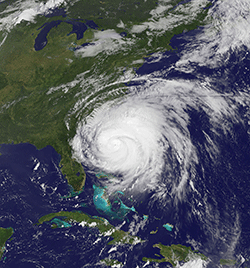
Hurricane Irene hits New England hard in 2011.
Lead author Lisa Baldini of Durham University says the tropical expansion has been "largely driven by man-made emissions," and if they continue unabated, hurricane tracks will likely keep shifting north—but without easing the risks in the tropics. That's because rising sea-surface temperatures not only promote hurricane development but "also provide extra energy, potentially fueling larger storms," according to co-author James Baldini, also of Durham. He says, "We therefore need to prepare for the effects of more frequent landfalls of larger storms along the Northeast coast of the United States and stronger storms impacting the Caribbean."
The article is titled "Persistent northward North Atlantic tropical cyclone track migration over the past five centuries," and its research was funded by the European Research Council, the National Science Foundation in the U.S., Chicago's Alphawood Foundation, the Swiss-based Schweizer National Fund and Sinergia, and the Inter-American Institute for Global Change Research.
